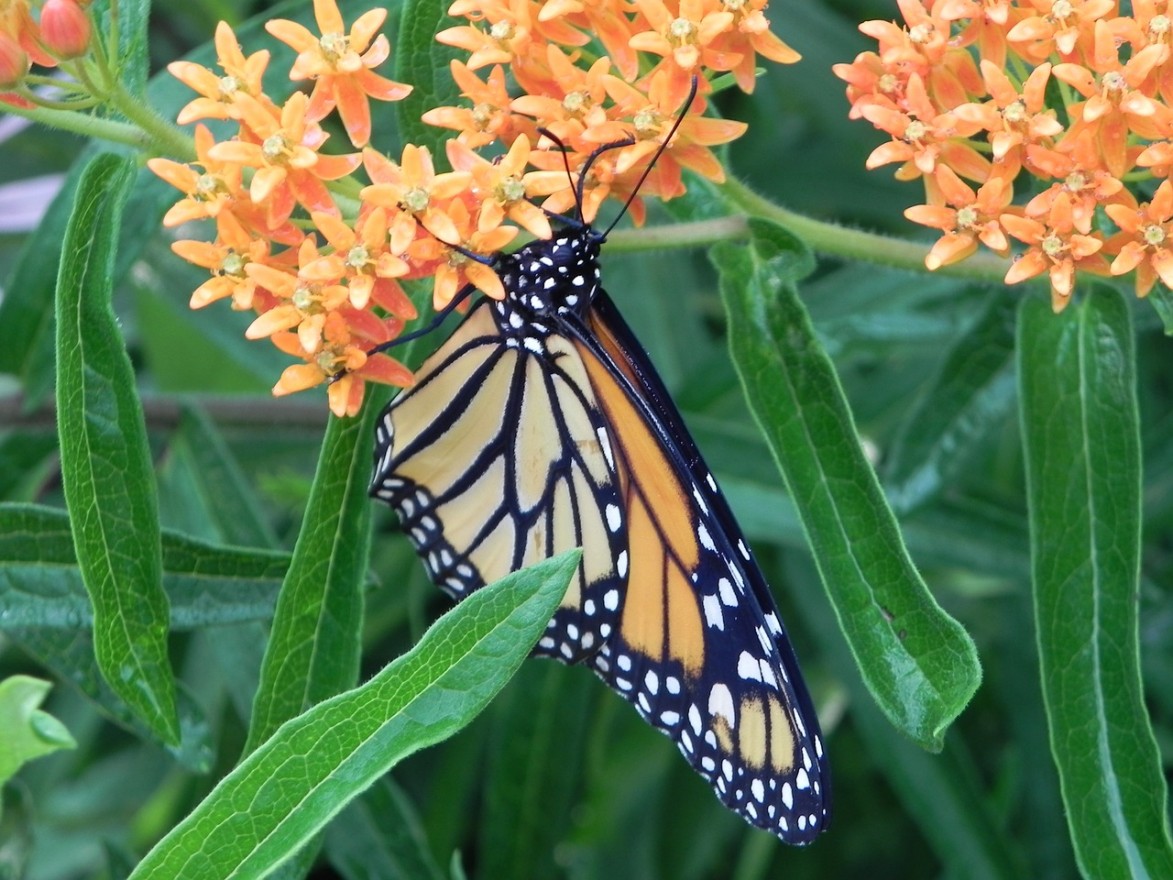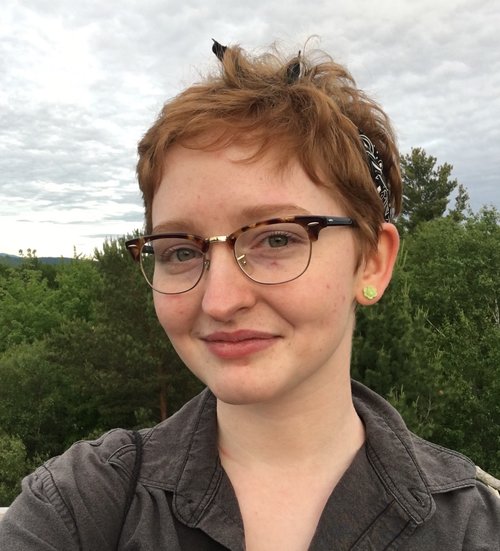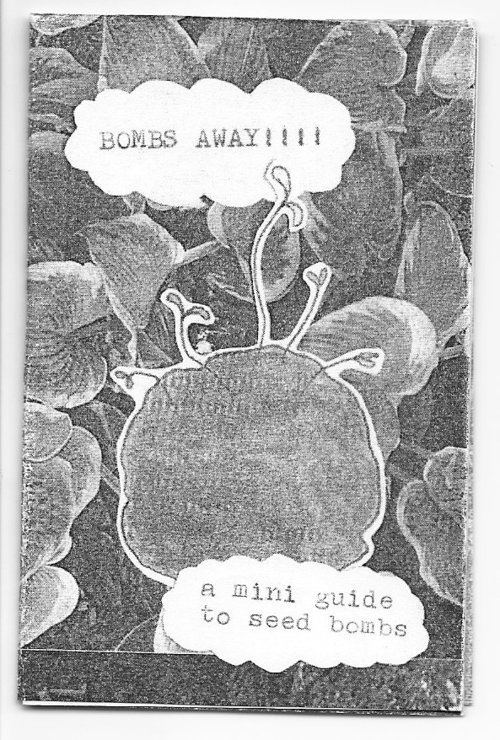
Emma Percy uses milkweed seed bombs to support native flora and fauna growth in Albert, New York. Milkweed is a native species and an important food source for the Monarch Butterfly. (Pixabay)

Emma Percy uses milkweed seed bombs to support native flora and fauna growth in Albert, New York. Milkweed is a native species and an important food source for the Monarch Butterfly. (Pixabay)
Emma Percy is the last person you’d expect to possess a penchant for making bombs. Bright-eyed and auburn-haired with a gentle, friendly smile, the artist (who uses the pronouns they and theirs) looks more “cheerful-creative” than “military mastermind.” Could an architect of destruction be lurking beneath Percy’s artsy exterior?
The answer, of course, is a resounding “no.” The truth is that this apparent mismatch of personality and appearance is no mismatch at all, and the explanation lies in the nature of the “weapons” Percy creates. Not harbingers of destruction, but messengers of hope, happiness, and healing; the bombs the artist crafts are designed to spread life, not death. And this is not just an analogy, for each tiny bomb is filled with flowers rather than fire. To be more exact, Percy’s bombs are brimming with seeds that will sprout into an array of wildflowers and other plants when they’re unleashed upon the world.
It is not just plants that grow from the seed-bombs Percy creates, either. What these little works of art are really intended to cultivate is a relationship: a connection between people and the places that surround them. The artist’s mission is to help others develop and tend to their relationships with their local ecosystems, teaching them to care for and appreciate the living communities in which they are immersed.
Inspired by personal connections to the landscapes and ecosystems of New York’s Southern Tier, Percy works to explore and honor these connections through art. Much of the artist’s work incorporates place-specific materials, from seed-bombs filled with native plants to hand-made paper and books created using flowers, leaves, and other organic matter from nature.

“I don’t think my art practice and my love of nature have ever been separate,” Percy said.
As a 2017 graduate of Alfred University in Alfred, N.Y., classes that focused on making art based on investigating place and natural processes helped Percy find a sense of purpose as an artist.
Percy’s recent work is intended to evoke curiosity and inspire people to learn more about the ecological communities of which they are a part. While an artist in residence at the Adirondack Interpretation Center (AIC), run by the SUNY College of Environmental Science and Forestry (SUNY-ESF), Percy encouraged visitors to appreciate and become stewards of the environment.
The paper Percy created during the residency became not only a surface on which to write such a message, but an incarnation of the message itself. By transforming native plants into raw material for individual, hand-crafted sheets of paper, the artist carefully directs viewer’s attention to the beauty found in the native plants we often view as weeds. One of Percy’s favorite sources is milkweed, a native plant that is a critical resource for monarch butterflies and also happens to produce a beautifully iridescent paper with an appealing, silky shimmer.
Gathering the milkweed seed fibers, which is best done in fall after the first frost, also helps Percy get in touch with the cycle of seasons. These seasonal shifts — along with other ecological topics like the distribution of species — figure prominently in much of the art Percy produced during the summer residency at the AIC. The science bound up in understanding these natural processes provides a clear link between Percy’s work and the mission of SUNY-ESF, focusing on both the technical and social aspects of sustainability. By taking an innovative and beautiful approach to exploring the environment and our connection to it, Percy is advancing a creative model for inspiring people to learn about and safeguard the diversity of life on Earth.

So while they may seem an unlikely pairing, science and art are clearly linked in Percy’s opinion. The artist holds that the two subjects aren’t as disparate as they may seem.
“Art and science are both about investigation and navigating the unknown, using different tactics to articulate the experience of being in the world,” Percy explained.
If art and science can come together to help people learn about the world around them, it isn’t so far-fetched to believe Percy’s conviction that art is also tied to another seemingly unrelated cause: activism. In fact, art and activism are inherently complementary, according to Percy.
“[Art is] a way to introduce new ideas to society and to conceptualize alternative ways of being in the world,” Percy said. If that doesn’t count as activism, then not much does.
Returning to the subject of seed-bombs, one can see just how socially — and environmentally — conscious Percy’s art really is. The act of scattering seeds may not jump out as an effective agent of social change, but the purpose behind these little packages of life illuminates their true power. Seed bombs are part of a tactic the artist (and others) have termed “guerrilla gardening,” the act of intentionally growing plants on land that you don’t own. Besides spreading beauty and restoring native species in everything from vacant lots to public parks and even private lawns, sowing these “illegal” seeds subverts the social fabric of property rights, while subtly challenging the separation of humans and nature that has become so pervasive in modern culture.
While they may not have the explosive force of their more dangerous cousins, seed-bombs have a transformative power of their own. By teaching others to make seed-bombs using plants native to their unique ecological surroundings, Percy is fostering a connection between humans and the environment, speaking out against the alienation of people from nature and a myriad of other social constructions. Percy says seed-bombs are just one of many creative strategies we can use “to cultivate life and be a steward of the land without boundaries.”
All of Percy’s work, from paper, to books, to prints and hand-bound journals, supports this creative and forward-thinking style of activism. And the artist says they are not alone in using art to push for progress in society. “There are plenty of artist-activists out there finding ways to use art as a tool to change the world,” Percy said.
For those looking to try their own hand at melding creativity and environmental awareness, Percy suggests connecting with others who have already opened their eyes to the power of art as activism. According to the artist, the best way to learn is by “just having candid conversations with all kinds of people — about what’s important to them and to you, and about the place and the community you’re both in.”
Ultimately, Percy says that “making art of any kind means forging your own path.”
In other words, everyone will come to their own conclusions about how to reconnect with the landscape, take care of their ecological community, and encourage others to do the same.
Watching Percy blaze ahead on this creative course, it’s clear that a determined spirit blooms beneath the artist’s peaceful façade. It turns out Percy is a warrior after all; with bombs full of flowers and a milkweed-paper shield the artist is charting a course towards a better future for people, plants, and the planet we call home.